Monday, October 11, 2021/07.00PM /By AbdulQudus Isiaka, Proshare Research /Header Image Credit: EcoGraphics
Over thelast three quarters of 2021, global Central Banks have been pressed to form acounterbalance to the gradual loss of monetary control in their domesticeconomies as blockchain-based cryptocurrencies went on the ascendency as ameans of payment and settlement. Nevertheless, with global Central Banksdesigning and deploying Central Bank Digital Currencies (CBDCs), things arepivoting in new directions but with additional uncertainty.
For example,with China slamming iron-fists on using crypto coins in domestic payment solutions,the world stands at the edge of a grand battle between unregulated,privately-issued currency and what has historically been 'fiat' or state-backednotes.
Theauthorities have clamped down on cryptocurrencies for business, retail, and commercialtransactions as the Chinese state pivots towards a Central Bank DigitalCurrency (CBDC). The outlines of the currency are still sketchy, but theintention is clear; to root out commercial and public settlement arrangementsbased on money that the government does not control. But what precisely is astate-controlled electronic currency or Central Bank Digital Currency (CBDC)?
PaulineAdam-Kalfon, a Partner at PwC Financial Services, noted that "Central BankDigital Currencies are immediate alternative solutions to further financialinclusion efforts by public authorities. As sovereign digital Cash, they cancontribute to modernizing the current monetary system but also help to bridgethe gap with the unbanked," she noted.
Nigeria's CBDCwas to be launched on October 01 2021, the country's 61st independenceanniversary. Unconfirmed reports suggest that the postponement was the resultof a surge in the traffic on the eNaira website, the suit earlier filed byENaira Payment Solutions Limited, a private payment platform, before theFederal High Court demanding that the CBN changed the name "eNaira" (being acopyright name of an existing currency).
The CBNbegan to consider the creation of the eNaira in 2017, as digital paymentsgained more popularity among Nigerians. By August 2021, the apex bank partneredwith Bitt Inc., a firm renowned for introducing the Eastern Caribbean CentralBank (ECCB) CBDC pilot, launched in April 2021. This came when many othercountries had begun to consider the introduction of their digital/electronicmoney. According to the Atlantic Council, 81 countries are currently makingprogress with their CBDC Programs, with 5 countries having launched their CBDC.In contrast, 14 others have their CBDC programmes at the pilot stage and 16countries have reached the development stage of their CBDC programs.
Between CBDCs and Cryptos
Cryptocurrencieshave become a common feature in the portfolio of many investors, especially theyouth; this is apart from being a popular medium of exchange. While cryptos aredecentralized and, in effect, not regulated by any government, thedistributed-ledger technology which supports them ensures that holders cancomplete transactions in near anonymity.
Analystshave noted that this same feature of cryptos that makes them attractive to manyalso threatens Central Banks. Hence, national regulatory bodies, including theIMF, call for caution against countries adopting Bitcoin, Ethereum, etc. Intheir place, governments have opted to provide digital monetary alternatives,which are electronic fiat money issued and backed by Central Banks. Besides,the number and seriousness of regulations guiding the use of cryptocurrencies haveincreased daily.
Mostnotably, China recently placed a hard-line ban on cryptocurrency trading,making all transactions illegal, regardless of where their accounts are domiciled.The Peoples Bank of China (PBoC) had as early as 2013 cited high energy usage(in crypto mining), money laundry, smuggling, and other uses to whichcryptocurrencies are put as the reason for imposing stiff regulations. USregulators have also made similar moves. In an event organized by the WashingtonPost, SEC Chairman, Gary Gensler, noted that there does not seem to bea future for cryptocurrencies, as stricter measures and regulations are in theworks. This is coming when the Federal Reserves Chairman, Jerome Powell, hassignalled the possible introduction of an American CBDC.
On February5, 2021, the CBN in a circular numbered BSD/DIR/PUB/LAB/014/001 barred DepositMoney Banks from facilitating payments for cryptocurrency exchanges. In themonths that followed, the apex bank stepped up plans to introduce the state-backeddigital currency.
Ahead of theintroduction of the eNaira, the CBN released policy guidelines on October 1. Thedocument detailed the various participants in the launch and usage of the CBDCand their specific roles. The eNaira would operate through a two-layered model- a structure that provides for public-private partnership. The CBN holds theliability for the eNaira but circulates it through financial institutions (SeeIllustration 1 below).
Illustration 1: Central Bank Digital Currency: Participantsand their roles
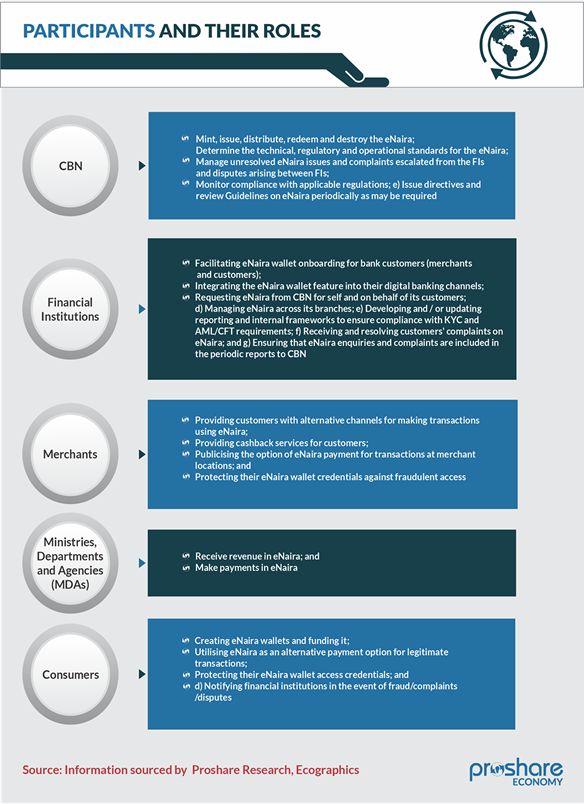
Unpacking the eNaira
Theregulatory guidelines on the eNaira released on October 01 also provide awalk-through on the mechanics of the eNaira platform. Regular users can use the eNaira bydownloading the "eNaira Speed Wallet" from app stores. After meeting allthe requirements, including providing a unique identifier like TIN/NIN or BVN,the user would obtain validation and activation from their preferred financial institution.
The eNaira catersto four scales of transactions: ConsumerTransactions, Merchant/Wholesale Transactions, Financial transactions, and MDATransactions.
Consumer/RetailTransactions refer to the range of services available to regular consumers onthe eNaira platform. At this level, holders of the eNaira are allowed to engagein Person-to-Person (P2P) transactions; Person-to-Business (P2B) and vice versa;Person-to-Government (P2G) and vice versa. Likewise, holders of the eNaira cantransfer Cash or Bank accounts to eNaira wallet; and vice versa. The dailytransaction limit for individuals without a verified NIN is N50,000, while those consumers who haveexisting bank accounts and BVN can transfer up to N1m (SeeIllustration 2 below).
Illustration 2: CBDC-Cumulative Balance and TransferLimit for Consumers
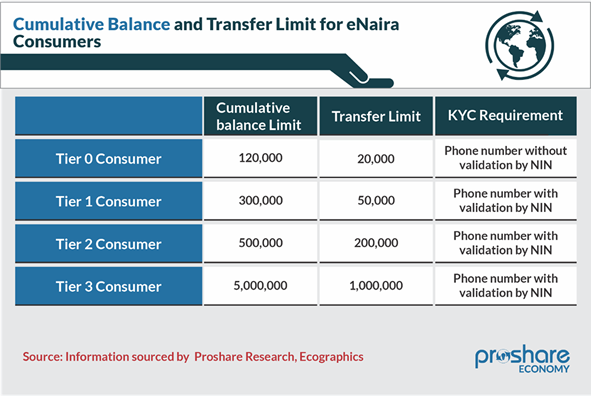
The secondform of transaction on the eNaira platform is Merchant Transactions. Thesetransactions allow Merchant Business users to engage in Merchant Business toPerson (M/B2P) transactions and enable them to transfer their Cash to their eNairawallet. Importantly, unlike consumers, Merchants are expected to close theirtill balance to their Financial Institutions daily. Merchants, however, have no transfer limit(SeeIllustration 3 below).
Illustration 3:CBDC- Cumulative Balance and Transfer Limit for Merchants
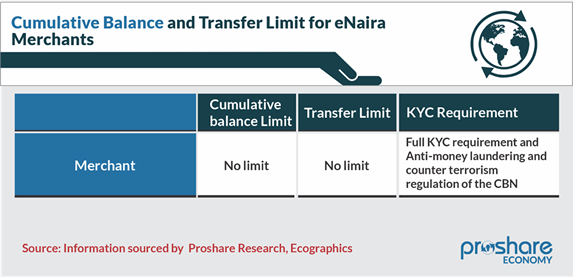
FinancialInstitution Transactions allow Financial Institutions, which serve asintermediaries between the CBN and customers, to transfer funds from theirwallets to the CBN and vice versa. Similarly, Financial Institutions cantransact with Government and vice versa. Again, the eNaira caters to transfersbetween businesses and Financial Institutions and transfers between the FinancialInstitutions and their Customers.
The fourth categoryof transactions that could use the eNaira platform is the MDA Transactions. Thesescales of transactions facilitate the transfer of digital funds between MDAs toIndividuals (vice versa) Person to MDAs; this category also supports transfers betweenMDAs, the transfer between MDAs and FIs vice versa catered for under this scale.
The various participantswill hold a unique wallet type (See illustration 4 below).
Illustration 4: Types of wallets held by the variousparticipants
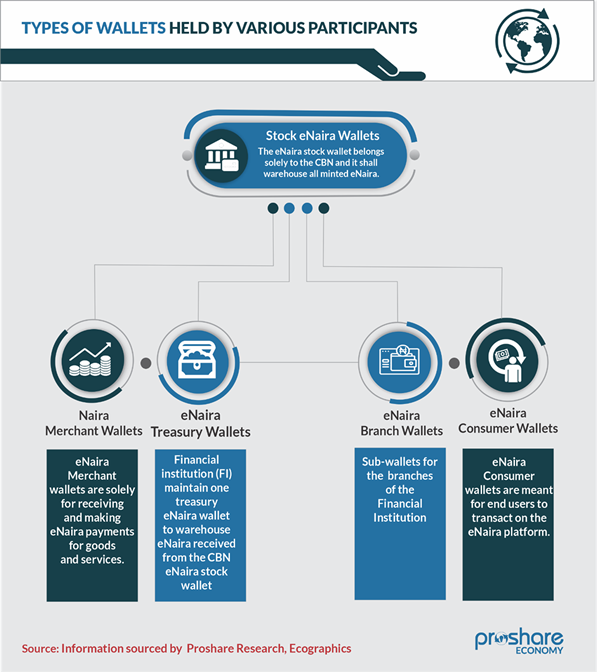
The eNaira Payoff
The eNaira willbe more cost-effective than cash. Although it performs the same functions asphysical currency, CBDCs do not have to be printed now and again like their physicalcousins. According to statistics from the Central Bank of Nigeria's (CBN's) currencyoperations department, between 2014 and 2019, Nigeria spent a total of N307billion on producing banknotes. With the introduction of the eNaira, the countrywould save a ton on its currency management.
Theintroduction of the eNaira in Nigeria is expected to promote financialinclusion by helping the many unbanked people to get more convenient andreliable access to money through their mobile devices and phones. As of March2021, data from the Nigeria Inter-Bank Settlement System Plc (NIBSS) shows thatonly 47m BVN numbers exist; this impliesthat less than 40% of Nigeria's adult population have access to a bank account.Analysts expect that a state-backed digital currency like the eNaira would helpbring more Nigerians into the formal banking system, a situation which itselfwould see the effect of monetary policy changes transmit quicker to theeconomy. Apart from this, the eNaira is expected to improve the ability of the Governmentto deploy targeted social interventions and cash transfer programs.
Since theNigerian CBDC- the eNaira would only exist in electronic form and would beexchangeable for other CBDCs, local and international transfer of funds can be completedmuch faster and lower cost. This, in turn, could lead to an increase in theannual remittances from abroad.
Perhaps the strongestargument favouring the eNaira is the need to create an alternative tocryptocurrencies that have become widely accepted due to the digitization oftrade and commerce. However, they have been beneficial to individuals engagedin some form of illegal activities.Essentiallythe eNaira is expected to offer the best of both worldsâ€â€the convenience andsecurity of digital cryptocurrencies, and the regulated, reserve-backed moneycirculation of the traditional banking system
Swerving Past Pitfalls
Despite themany incentives for introducing the eNaira, specific challenges need to be addressedto succeed digital money. The widespread illiteracy and low internetpenetration seem to pose significant difficulties. Another concern that needsto be considered as the eNaira is being introduced is the liquidity concernsthat may arise when customers make too large a withdrawal from banks to buy theeNaira. Also, being a centralized system,the eNaira could face cybersecurity challenges. Finally, the CBN must regularlyupdate the eNaira platform with new features and technology to meet users'changing needs.
Related Video
1. CIBNHosts Discourse on Blockchain Tech in Nigeria - Feb28, 2017
Related Links
1. CBNe-Naira Series 2: Can the e-Naira Deepen Financial Inclusion?
2. CBNe-Naira Series 1: Examining the Positives
Related News - Digital Assets
1. LegallySpeaking, is Digital Money Really Money? - January14, 2021
2. GhanaLaunches World's First Digital Finance Policy Amid COVID-19 - January08, 2021
3. Banks andThrifts May Participate in INVN and Use Stablecoins for Payment Activities - January05, 2021
4. IOSCOPublishes Report on Education of Retail Investors Regarding Risks of Crypto-Assets - December24, 2020
5. HowCentral Banks Can Catalyze Financial Inclusion Through Digital Currency - October16, 2020
6. Regulationof Cryptocurrency and Digital Assets In Nigeria: New Beginnings - October15, 2020
7. StakeholdersCall for Clarity in Regulation and Standardization of Nigeria's Digital AssetMarket - September 28, 2020
8. DigitalAssets Classification Aimed at Investor Protection - SEC - September21, 2020
9. SECNigeria Issues Statement on Digital Assets, Their Classification and Treatment - September14, 2020
10. ChinaStarts Major Trial of State-Run Digital Currency - April 30, 2020
11. AnalystsDiscuss Blockchain Technology and Regulation of Digital Assets in Nigeria - November18, 2019
12. Winds ofChange: The Case for New Digital Currency - November15, 2018
13. BarclaysFiles Two Digital Currency and Blockchain Patents with U.S. Patent Office - July21, 2018
14. SaudiArabia Capital Market Authority Warns Investors Against Digital Currency Investment - February13, 2018
15. DistributedLedger Tech Solutions For Settlement Of Payments Using Central Bank DigitalCurrency - October 13, 2017
16. China IsDeveloping its Own Digital Currency - March 04, 2017
17. Sweden's CentralBank Considers Issuing A Digital Currency - November16, 2016
Related News - BlockChain & Cryptos
1. China's Central BankDeclares all Cryptocurrency Transactions 'Illegal'
3. CBNSelects Technical Partner for Digital Currency Project
4. CBNTargets October 1 for Digital Currency Launch
5. 6 Drawbacks ofCryptocurrency and How You Can Work Around It
6. Top High Pay CryptoJobs in Nigeria - Alternative Ways to Earn with Crypto in the Bear Market
7. Lagos Blockchain andCrypto-Arts Conference 2021
8. Digital WalletOpportunities in Middle East and Africa: A Whitepaper by Omdia, in Partnership
9. Monetary Authority ofSingapore and Banque de France Report Success from CBDC Experimentation
10. The Launch of theDigital Naira and its Likely Impact
11. The Changing Face of Finance,A New System Beckons
12. Top Five MicrocapCrypto Projects in 2021
13. How Does Blockchain Technology Work?
14. The Cryptocurrency Frenzy: A Call for Caution
15. Bitcoin Price Crash: Is This the End of theBitcoin Bubble?
16. Most Important Things You Should Know AboutBitcoin
17. Central Bank of Portugal Grants First CryptoExchanges Operating Licenses
18. Things You Need to Consider Before UsingCrypto Signals
19. CBN to Launch Digital Currency Before December
20. E-Cedi: Bank of Ghana to Pilot DigitalCurrency
21. Digital Currency: A Right Move to be Adoptedby the CBN?
22. Why Bitcoin May Speed Up the Transition toRenewable Energy
23. Potential of Blockchain for FinancialInclusion in Nigeria
Related News - Monetary Policy
1. Steady Growth in PSCE;Grew by 9.8% YoY in August 2021 to N33.4trn
2. How to Stabilize theNaira - Ayo Teriba
3. CBN Communique No. 138of the MPC Meeting - Sep 16-17, 2021
4. September 2021 MPCMeeting: CBN Retains All Policy Parameters
5. Pre-MPC Note: WillStatus Quo Be Maintained?
6. A Winning Formula forMPC Members
7. Personal Statements bythe MPC Members at the 137 MPC Meeting of July 26-27, 2021
8. Is the Economy Spiraling? - LBS ExecutiveBreakfast Session - February 2021
9. Total Value of Capital Importation intoNigeria Stood at US$1,069.68m in Q4 2020 - NBS
10. Rebasing Nigeria's GDP: New National Accounts,More Services
11. Diaspora Remittances inNigeria: Examining the New CBN Policy (2)
12. Diaspora Remittances inNigeria: Examining The New CBN Policy (1)
13. Inflationary Pressure Still Straining Pockets
14. CBN Deals the House Card as Policy RatesRemain Unchanged
15. CBN Communique No. 134 of the MPC Meeting -Jan 25-26, 2021
16. MPC Holds All Policy Parameters at the End ofIts First Meeting in 2021
17. Monetary and Interest Rate Policy in 2021:Going for Growth
18. CBN to Sustain Expansionary Monetary PolicyTill Q1, 2021 - Cordros Securities
19. Ten MPC Members, One Shared Outlook
20. Personal Statements By The MPC Members At The133 MPC Meeting of Nov 23-24, 2020
21. CBN Rolls the Dice to Tackle Market Liquidityand Dollar Dearth
22. Implications of CBN's Introduction of ItsSpecial Bills to the Market
23. CBN Introduces Special Bills to Deepen theFinancial Markets, An Additional Liquidity Mgmt Tool
 Lagos, NG • GMT +1
Lagos, NG • GMT +1










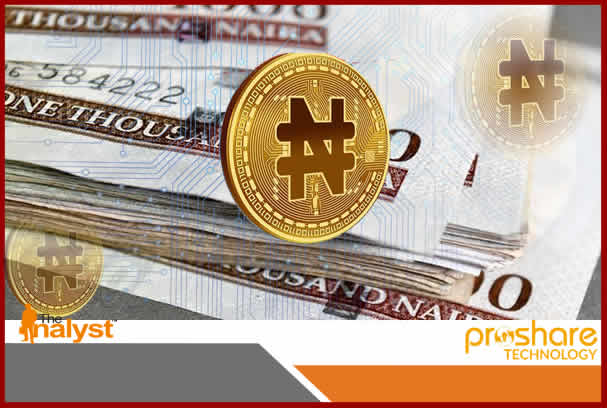
 4255 views
4255 views




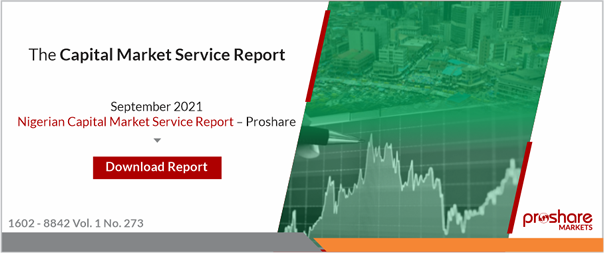





 Sponsored Ad
Sponsored Ad
 Advertise with Us
Advertise with Us









